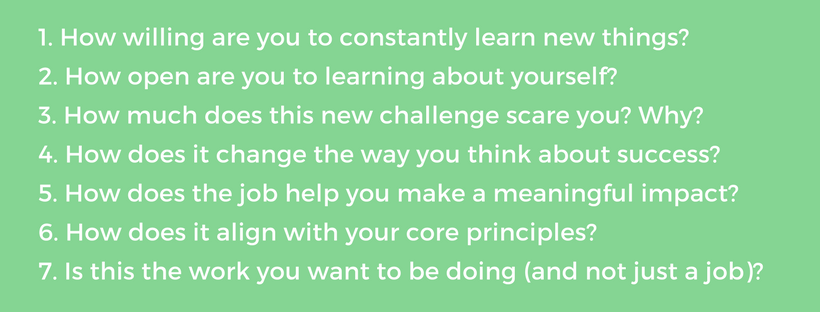Changing jobs is not an easy job!
After 3 years (that felt like 6 because they were so intense – in a good way), the opportunity to take on another role meant I had to face a difficult decision.
I had to choose between:
- a job I loved and challenged me, in a team I truly cared about;
- and the chance to take on a new role that would push me to grow even faster, in a more focused direction, within a team that didn’t know me.
Sometimes, an opportunity that comes out of the blue can make the decision more difficult. The surprise factor means you now have a big decision on your hands when you didn’t ask for. No matter what you decide, it’s a choice you have to make and live with.
Changing jobs is one of the most difficult decisions because it ties into so many key aspects of our lives:
- financial stability
- professional growth
- our sense of self-worth
- our desire to fit in and be accepted, etc.
Changing jobs: Comfortable certainty vs. the risky unknown
This is what makes us anxious about this particular choice.
Common knowledge argues that dealing with the devil you know is easier. However, that doesn’t mean it’s better for you in the long run.
In the interviews I’ve held over the past years as a manager (around 50), I’ve seen people dealing with all sorts of challenges.
- Even though they were actively searching for a job, some were unsure of what they want to achieve.
- Others were scarred by their most recent experience and were too defensive to own up to what they wanted to achieve.
- A few even backed down after applying for undisclosed reasons.
- And I even saw one or two people use the job opportunity to increase their salary in their current workplace.
I’ve gone through these stages myself (except for the last two) and I get it. Changing jobs and interviewing make us feel vulnerable and exposed.
But there’s another way to look at it.
The best interviews I had, both as the applicant and the employer, were friendly talks. We truly connected because each of us opened up and really talked about what we could achieve together. We honestly discussed what we wanted to learn, what the challenges were, what got us excited and what put us down about the role or work environment.
While most interviews were emotionally draining for me (being an introvert 79% of the time), these particular talks fueled me for days!
I believe that’s because we both saw the interview as an opportunity to get to know each other and understand if we align on the same values.
It was not just about that job, that role, that specific moment in time. We were both interested to see how this opportunity would shape us as humans, not just as employees.
Personal experience and watching close friends and other people I look up to prove that constantly pushing ourselves to deal with uncertainty helps us grow faster and achieve more in the long run.
So I encourage you to be vulnerable, open and transparent about your expectations and fears the next time you interview for a job.
To help, I gathered some questions to help you muster up the courage.

Big decisions need powerful resources
This is why I chose two books to recommend instead of articles this week.
The Art of Possibility is one of those books whose knowledge came at the right time to make a huge impact for me. It helped me change the way I make decisions by building a more resilient mindset and focusing on solutions and opportunities.
Here’s a sample:
“When you are oriented to abundance, you care less about being in control, and you take more risks. You may give away short-term profits in pursuit of a bigger dream; you may take a long view without being able to predict the outcome. In the measurement world, you set a goal and strive for it. In the universe of possibility, you set the context and let life unfold.”
Ego is the Enemy is another favorite that’s helped me become a better colleague and young manager over the past 2 years.
I filled pages with notes from the book to keep myself aware of the dangers of letting my ego get in the way of decision-making and life in general.
“The power of being a student if not just that it is an extended period of instruction, it also places the ego and ambition in someone else’s hands. There is a sort of ego ceiling imposed – one knows that he is not better than the “master” he apprentices under. Not even close.”
I hope these books will be as useful for you as they were for me. If you read them, I’d love to hear if they helped you in any way.